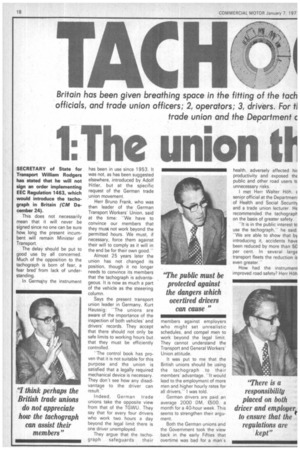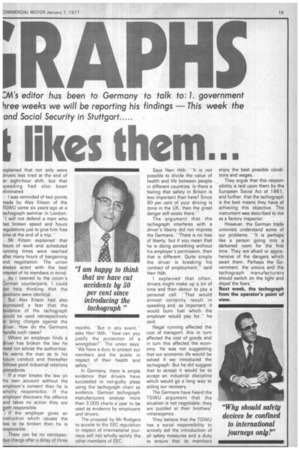:The union tt
Page 20

Page 21

If you've noticed an error in this article please click here to report it so we can fix it.
t likes them. U.
SECRETARY of State for Transport William Rodgers has stated that he will not sign an order implementing EEC Regulation 1463, which would introduce the tachograph in Britain (CM December 24).
This does not necessarily mean that it will never be signed since no one can be sure how long the present incumbent will remain Minister of Transport The delay should be put to good use by all concerned_ Much of the opposition to the tachograph is born of fear, a fear bred from lack of understanding.
In Germany the instrument has been in use since 1953. It was not, as has been suggested elsewhere, introduced by Adolf Hitler, but at the specific request of the German trade union movement.
Herr Bruno Frank, who was then leader of the German Transport Workers" Union, said at the time: "We have to convince our members that they must not work beyond the permitted hours. We must, if necessary, force them against their will to comply as it will in the end be for their own good."
Almost 25 years later the union has not changed its position, though it no longer needs to convince its members that the tachograph is advantageous. It is now as much a part of the vehicle as the steeering column.
Says the present transport union leader in Germany, Kurt Haussig: "The unions are aware of the importance of the inspection of both vehicles' and drivers' records. They accept that there should not only be safe limits to working hours but that they must be efficiently controlled.
"The control book has proven that it is not suitable for this purpose and the union is satisfied that a legally required mechanical device is necessary. They don't see how any disadvantage to the driver can result.'" Indeed, German trade unions take the opposite view from that of the TGWU. They say that for every four drivers who work two hours a day beyond the legal limit there is one driver unemployed.
They argue that the tacho graph safeguards their members against employers who might set unrealistic schedules, and compel men to work beyond the legal limit. They cannot understand the Transport and General Workers' Union attitude.
It was put to me that the British unions should be using the tachograph to their members' advantage. "It would lead to the employment of more men and higher hourly rates for all drivers,'" I was told.
German drivers are paid an average 2000 DM, £500 a month for a 40-hour week. This seems to strengthen their argument.
Both the German unions and the Government took the view back in the early Fifties that overtime was bad for a man's health, adversely affected hi productivity and exposed thE public and other road users tc unnecessary risks. .
I met Herr Walter Hoh, senior official at the Department of Health and Social Security and a trade union lecturer. HE recommended the tachograph on the basis of greater safety.
"It is in the public interest to use the tachograph," he said. "We are able to show that by introducing it, accidents have been reduced by more than 50 per cent. In several large transport fleets the reduction is even greater."
How had the instrument improved road safety? Herr Hoh
explained that not only were drivers less tired at the end of an eight-hour shift, but that speeding had also been eliminated.
I was reminded of two points made by Alex Kitson of the TGWU some six years ago at a tachograph seminar in London: "I will not defend a man who has broken speed and hours regulations just to give him free time at the end of a trip.'"
Mr Kitson explained that hours of work and scheduled running times were reached after many hours of bargaining and negotiation. The union always acted with the best interest of its members in mind.
As I listened to the union's German counterparts, I could not help thinking that the positions were identical.
But Alex Kitson had also expressed a fear that the evidence of the tachograph would be used retrospectively to bring charges against the driver. How do the Germans handle such cases?
Where an employer finds a driver has broken the law he need not advise the authorities. He warns the man as to his future conduct and thereafter follows good industrial relations procedures.
If a man breaks the law on his own account without the employer's consent then he is wholly responsible If the employer discovers.the offence and takes no action they are both responsible.
If the employer gives an instruction which causes the law to be broken then he is responsible.
There can be no retrospective charge after a delay of three
months_ -But in any event," asks Herr Hah, "how can you justify the protection of a wrongdoer?" The union says: -We have a duty to protect our members and the public in respect of their health and safety."'
In Germany, there is ample evidence that drivers have succeeded in not-guilty pleas using the tachograph chart as evidence. German tachograph manufacturers analyse more than 3.000 charts a year to be used as evidence by employers and drivers_ The proposal by Mr Rodgers to accede to the EEC regulation in respect of international journeys will not wholly satisfy the other members of EEC.
Says Herr Hoh: "It is not possible to divide the value of health and life between people in different countries. Is there a feeling that safety in Britain is less important than here? Since 90 per cent of your driving is done in the UK, then the great danger still exists there.'" The argument that the tachograph interferes with a driver's liberty did not impress the Germans_ -There is no loss of liberty, but if you mean that he is doing something without his employer's permission, then that is different. Quite simply the driver is breaking his contract of employment,said Herr Hoh.
I explained that often, drivers might make up a bit of time and then detour to pay a personal call. "That would almost certainly result in speeding and, as important, it would burn fuel which the employer would pay for,he said.
Illegal running affected the cost of transport; this in turn affected the cost of goods and in turn this affected the economy. He was not suggesting that our economic ills would be solved if we introduced the tachograph. But he did suggest that to accept it would be to accept an industrial discipline which would go a long way to aiding our recovery.
The Germans have heard the TGWU argument that the situation is not negotiable; they are puzzled at their brothers' intransigence_ They believe that the TGWU has a social responsibility to actively aid the introduction of all safety measures and a duty to ensure that its members enjoy the best possible conditions and wages, They argue that this responsibility is laid upon them by the European Social Act of 1961, and further, that the tachograph is the best means they have of achieving this objective. The instrument was described to me as a factory inspector.
However, the German trade unionists understand some of our problems. "It is perhaps like a person going into a darkened room for the first time. They are afraid or apprehensive of the dangers which await them. Perhaps the Government, the unions and the tachograph manufacturers should switch on the light and dispel the fears.'"
Next week, the tachograph from the operator's point of view.




















































































